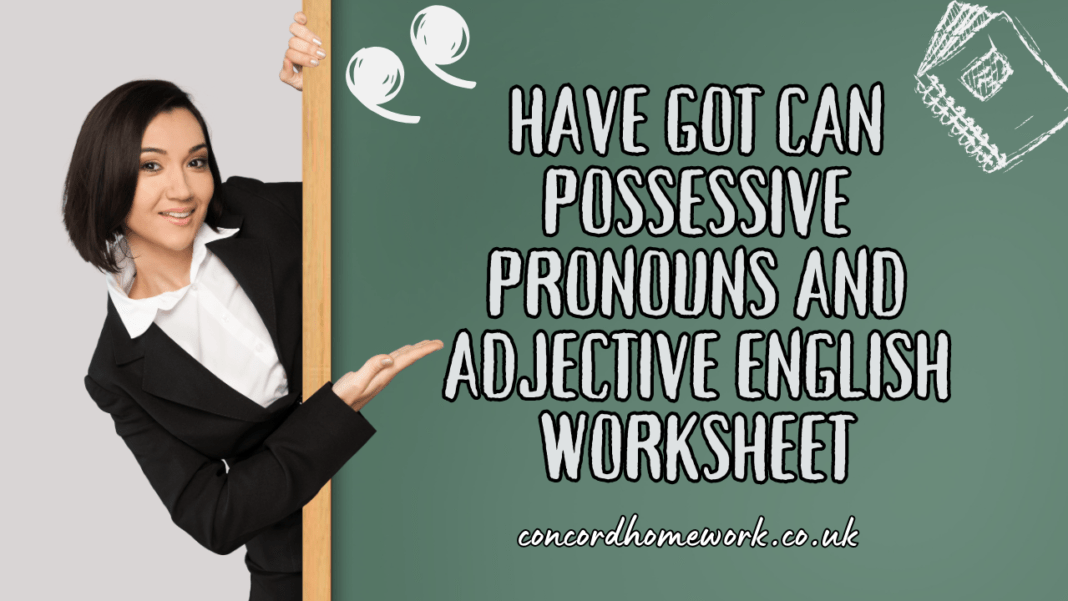Look, ask and answer. Then, write.
Make true sentences using can or can’t.
Read the examples. Then, complete
the table. Read and make sentences, as in
the example.
What can you do/not do? Put a tick
(✓) or a cross (x). Then, ask your friend
what he/she can/can’t do. Then, write.
This worksheet is about practicing have got, can, possessive pronouns and adjective in English. Students read and practice. The worksheet has an answer key.
* Download This English Worksheet: “Have got can possessive pronouns and adjective English worksheet”.
Mastering Essential Grammar: Have Got, Can, Possessive Pronouns, and Adjectives
As a grammar expert, I’m pleased to guide you through the intricacies of essential English grammar. Let’s explore the usage of “have got,” “can,” possessive pronouns, and adjectives in a formal context. These concepts are fundamental for beginners and can be seamlessly incorporated into daily conversations.
1. Have Got vs. Have: Possession and Relationships
| Topic | Explanation | Examples |
|---|---|---|
| Have Got | A less formal way to express possession, relationships, and characteristics. | – “I have got a big family.” – “She has got a good job.” |
| Have | More common in writing and slightly more formal. | – “They have a big garden.” – “He has a good job.” |
Usage:
- Possession:
- “I have got brown hair.”
- “My sister has got long hair.”
- Family and Friends:
- “He has not got many friends.”
- “They have got a new car.”
- Timetabled Events, Illnesses, Abstract Things:
- “They’ve got basketball practice this evening.”
- “He’s got a terrible cold.”
- “I’ve got a good idea!”
2. Can: Ability and Permission
| Topic | Explanation | Examples |
|---|---|---|
| Can | Expresses ability, permission, or possibility. | – “She can play the piano.” – “You can go now.” |
Usage:
- Ability:
- “I can swim.”
- “He can speak three languages.”
- Permission:
- “Can I borrow your pen?”
- “You can use my laptop.”
3. Possessive Pronouns and Adjectives
| Topic | Explanation | Examples |
|---|---|---|
| Possessive Pronouns | Replace nouns to show ownership. | – “This book is mine.” – “Is that umbrella yours?” |
| Possessive Adjectives | Modify nouns to indicate possession. | – “My sister has a new car.” – “His jacket is blue.” |
Usage:
- Possessive Pronouns:
- “This pen is mine.”
- “Is that bag yours?”
- Possessive Adjectives:
- “My friend has a new phone.”
- “His cat is black.”
4. Incorporating Grammar into Daily Life
- Introducing Yourself:
- “My name is John. I come from New York. I live in an apartment.”
- Talking About Hobbies:
- “I play the guitar. She paints beautiful landscapes.”
- Describing Your Routine:
- “I wake up at 7 a.m. every day. I have breakfast and then go to work.”
- Expressing Preferences:
- “I like coffee, but I don’t like tea.”
- Discussing General Knowledge:
- “The sun rises in the east.”
Remember, mastering these grammar concepts enhances your communication. Practice using them in sentences, and soon you’ll wield them with confidence! ????????
What topics do you need?
“Thank you for taking the time to explore this topic with us! We hope you found the information helpful and insightful. Have any thoughts, questions, or additional examples to share? We’d love to hear from you in the comments below!
Don’t forget to spread the word by sharing this blog with your friends, family, and colleagues. Together, let’s continue to learn, grow, and connect with the world around us. Happy reading and sharing!”




















